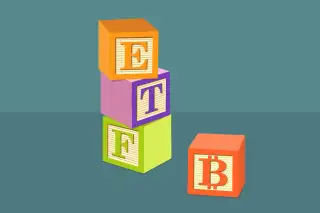When Will U.S. Investors Get a Bitcoin ETF?

Investors are hungry for Bitcoin. Yet if you want to invest in the digital currency today, you have to go out of your way to do it. That's why financial firms are pushing regulators to approve the first Bitcoin ETFs in the U.S.
These funds would be very similar to how gold ETFs gave investors the ability to invest in gold and track the price of the precious metal without going out and ordering gold coins to arrive in the mail, says Greg King, CEO of Osprey Funds. In June, Ark Invest filed a disclosure with the Securities and Exchange Commission (SEC) for a Bitcoin ETF called Ark 21Shares Bitcoin ETF. There have been eight other Bitcoin ETFs filed with the agency, CNBC reported. Recently, the SEC postponed its decision on asset manager VanEck’s ETF, saying the agency needed more time to gather input on the potential of market manipulation of the digital currency and, by extension, the fund. Just a later, the SEC delayed the decision on another Bitcoin ETF, Valkyrie Digital Assets.
Trading apps like Robinhood and Webull now offer crypto trading and even the once-staid robo-advisors, are trying to get in on the action. Meanwhile, financial advisors are waiting for the government’s go-ahead on Bitcoin ETFs before recommending the digital asset to clients.
But cryptocurrency is a risky business, with tons of volatility and speculation. In April, Bitcoin’s price hit a high of around $63,000 per coin, and now — just three months later — it sits down around $33,000. Here's what to know about plans for a Bitcoin ETF:
What would a Bitcoin ETF look like?
ETFs are a way of wrapping together various securities into one fund, which is treated similarly to a stock on a stock exchange in that you can buy and sell it as the price moves throughout the day. An ETF may hold Bitcoin itself, or Bitcoin futures (futures allow investors to speculate on the prices down the road), King says.
Plus, an ETF can be traded like stocks and bonds. Instead of having to open a separate account to track individual cryptocurrency prices, investors would likely be able to invest in the ETF through their brokerages like Fidelity and Charles Schwab, says Ben Weiss, CEO of CoinFlip, which provides Bitcoin ATMs.
“There are going to be people who like crypto who never get in because they’re not going to feel comfortable holding 20 different coins on a jumpdrive,” Weiss says. “An ETF is a way for people to invest in cryptocurrency without actually having to purchase it directly and without having to custody it themselves.”
Why hasn’t the government approved a Bitcoin ETF?
The SEC has brought up concerns about Bitcoin, including that investors should be cautious of the volatility and potential for fraud. There is a lot to be concerned about.
“Bitcoin itself is kind of a dodgy proposition,” says James Angel, a finance professor at Georgetown University. No one really knows who created Bitcoin, a few individuals hold a lot of the coins, exchanges can be sketchy and there are detrimental environmental impacts. On top of that, cybercriminals use cryptocurrency.
“It’s caused nothing but enforcement headaches for the SEC and so for this reason they have a very skeptical attitude,” Angel says. (The SEC did not respond to Money's request for comment.)
There’s also the fact that Bitcoin isn’t technically a security, and the SEC tends to regulate securities. But as the U.S. government continues to deny a Bitcoin ETF, other countries are moving forward. Canada, for example, approved the first Bitcoin ETF in North America earlier this year. For U.S. investors, foreign ETFs are treated like overseas investments, which may cause complications like the need for special permissions from some brokerages.
“The U.S. is very visibly falling behind,” says Timothy Spangler, partner at Dechert LLP where he leads the law firm’s digital asset blockchain practice.
When will there be a Bitcoin ETF?
When Gary Gensler, who previously taught blockchain and digital currency classes at the Massachusetts Institute of Technology, became chairman of the SEC earlier this year, crypto fans were excited that the changing of the guard may help their Bitcoin ETF cause.
“Gensler does understand blockchain and does understand crypto and I know he just started so I’m hopefully optimistic,” Weiss says.
Another argument that a Bitcoin ETF will happen this year is that if you look at all the queries about digital currencies the SEC is facing now, including some alleging serious improprieties, this one would be fairly easy to get over the finish line, Spangler says. But on the other hand, while some have said a Bitcoin ETF would be seen as a sign of maturity for the market, it’s not necessarily time pressing in that retail investors can, if they want, currently buy bitcoin directly, he adds.
King isn’t convinced we should expect a Bitcoin ETF this year. He says 2022 is likely the earliest, but that’s still “very much a question mark.”
Some of the issues and concerns that the SEC has highlighted are still out there, like the fact that most Bitcoin volume takes place outside the U.S. and therefore outside of U.S. regulatory supervision. It takes time to consider whether those issues have been addressed, says King, who plans to convert the Osprey Bitcoin Trust to an ETF whenever it’s possible.
“I’m not sure the administration’s top priority is figuring out whether or not a Bitcoin ETF makes sense,” King says.
More from Money:
Here's Why Financial Advisors Won't Recommend Cryptocurrencies — Even if They'd Like to